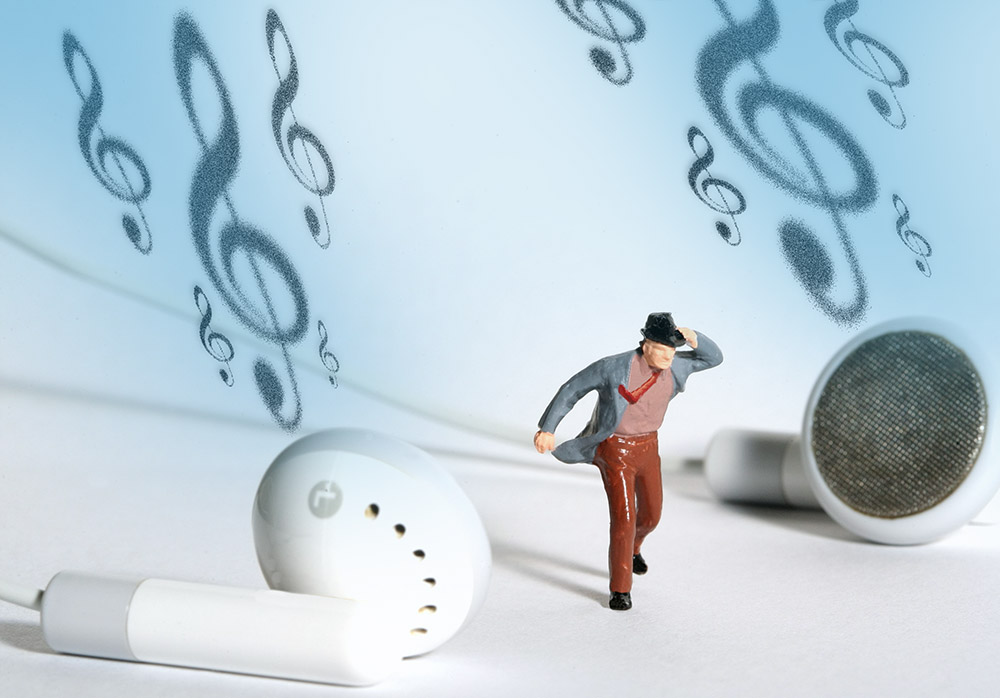
#1 Learn to Filter Noise at Home
When you workout your ears, are you working out your mind too? Sound filtering is the phrase we use when talking about how focusing on something essential and filtering out the sound distractions in the room. Exercising this skill keeps it sharp and that means you are able to understand a conversation even in a noisy space.
You can start your practice with music from a couple of different devices – maybe use the TV and your laptop. Now, ask a friend to sit with you and talk. Take time to focus on the conversation while ignoring the music playing around you from the various devices. Work this exercise in a room where you can change the environmental distractions easily like adjusting the volume.
How to do the Exercise
It’s a challenge for someone with hearing loss to listen to the conversation when there is a lot of distracting noise. That’s a problem most people have but one that is significant with serious hearing loss. Consider how a noise as simple as the heater or AC unit coming on could make hard to understand words unless you learn to keep your mind focused and your ears sharp with hearing exercises.
Start out by finding a comfortable place to sit. If you can avoid fidgeting you will be more successful at focusing. If possible, find a quiet place to do the exercise. It will be less frustrating if you have control over the distracting sounds.
Start a conversation and turn one device on low. Are you both still using your normal speaking voices? Can you hear the other person? If you answered yes to both keep moving on, if not, turn the volume down on the device until you can comfortably hear and speak with the other person.
After you’ve gotten used to filtering out one music source, try adding in the second one. To make it more challenging you can adjust the volume or add more devices. The best part is both you and your conversation partner will be doing something good for your ears and minds!
#2 Identify and Locate Sounds
Did you hear that? It’s the kind of question everyone asks regardless of hearing loss. The good news is by practicing how to locate a sound and identifying what’s making it is a proven way to strengthen your hearing.
This is a lot like the previous exercise, so you won’t need fancy tools or equipment. It’s also a great training exercise for outdoors whether you’re in the country or a major city. The goal is to surround yourself with varied sounds. The more diverse the environment the better!
How to do the Exercise
This straightforward task is good for your mental health because it works to strengthen the connections and pathways the brain needs to translate information coming from the ears. In other words, it will work to fine-tune your thinking so you can do more with less effort!
Look for a space that is bustling but comfortable. Maybe use the local shopping mall or food court. Now, close your eyes and focus on one single sound around you. Let your mind help you determine where that sound is coming from and what’s making it. Is it someone’s shoes clicking? Maybe it’s a child clapping her hands? If you can’t quite identify it try to figure out how big the object is that’s making the sound and how it makes you feel, or even what type of material might be used to create it. All of these small puzzle pieces together will help you determine what the noise is and strengthen your hearing at the same time.
#3 Play Brain Games
Not every exercise has to be a major hearing challenge. You can work all of your senses, including your hearing, by strengthening your mind. The brain serves as your translator, so you can improve sound recognition by focusing on its overall functioning. A doctor or hearing professional can provide you with specific games to improve your mental agility, but there are some you can do on your own.
How to do the Exercise
There are quite a few games that work for one or more players. For example, any kind of logic or strategy game will help and you can play it on your tablet, on your table, or in the newspaper.
Speaking of print publications, crossword puzzles and number games like Sudoku are powerful mind puzzles for someone who wants to flex their mental muscles on their own. Even tasks like crocheting will work your mind and keep it strong. Memory games are especially effective. They can be as basic as a card game or as exciting as a shell game. If those don’t appeal to you, keep looking because there are much more out there. For example, remember the Rubik’s cube? It can provide hours of pattern recognition and problem-solving practice.
Of course, don’t forget the social brain games such as playing chess, checkers, or scrabble with friends and family. It doesn’t matter what you do so long as you’re using your noggin!